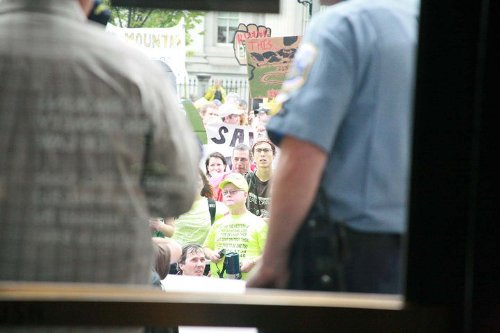
We could see the Appalachians outside the bank... Larry Gibson, in the green t-shirt is the godfather of the Movement.
When change comes to us, we call the people who brought that change, people who rallied and marched and finally forced us to change -- a "Movement." There are 600 causes on our computers every morning -- but only a small number will ripen into Movements.
What do Movements have that distinguish them? They share an organizational feature among their advocates that we call "community." From the Civil Rights through to the Gender Rights Movement thirty years later -- the people who did create change took the time to create long, continuous intertwining relationships. They met one another again and again in different combinations within that group, even while the community expanded toward the tipping point of change. They entered public space together, went public with their beliefs -- arm in arm, singing together, witnessing each other submit to arrest.
A Movement is a community in motion, moving as one against the oppressor, but living their lives together as they move. Movements are communities that move. They resemble towns or city neighborhoods, but they move toward a new world, changing assumptions, culture and laws. As they plan, and gather force for the next action, the participants fall in love, begin life-long friendships, artistic collaborations... Over time, children are born and people die in the movement, and survivors are tended to with the powerful communal healing of people who have fought together.
Community as the basis for Movement-making is in disrepute, replaced by mailings, marketing and polling, Twitter and Facebook. Or to put it this way -- technological shortcuts are believed to be good facsimiles of community. We are finding that this is not true. Passionate advocacy that is expressed in celebrity endorsements, bumperstickers and online petitions cannot replace the slower, deeper process of in-person relationships. You cannot stop a Wal-Mart by simulating the smiling visuals of community, in other words by staging a fake community the way that Wal-Mart does. The people who stop Wal-Marts are communities standing up together, intent on saving something mysterious and complex -- and also humorous, musical and surprising -- that they treasure in their town.
After our candidacy last year, and our exposure to a more fake community than we could tolerate -- remember the $100 million dollars worth of Mike Bloomberg walking like a neighborhood guy with handpicked actors, in his windbreaker picked by consultants... After a year of defending our city neighborhoods against this billionaire fake with his endless marketing, the invitation by some of the Appalachians in our choir to go to West Virginia brought us to the heart of a real social movement. We embraced it like we were saving our lives. We met people who suffered together for generations, burying each others' asthmatic and cancerous children and fathers, as they become braver and braver together, behind the banners of Judy Bonds, Larry Gibson, Maria Gunnoe, Lorelei Scarbro -- legendary figures pushed up into the light by their communities.
Last week during "Appalachia Rising" in Washington D.C., we sang "Keep Your Eyes On The Prize," our arms interlocked with Quakers and young eco-anarchists. It was the PNC Bank -- a block from the White House. This bank's business had to stop that day because it finances the exploding of mountains. We could see through the front windows a couple thousand Appalachian people singing songs supporting us. There was the distinctive quality of community there. It surprised me how specific it felt. This was not an audience. This was not a political party or a focus group. This was community. I went straight to certain moments in my life, when I lived in a healthy neighborhood and people cared for each other openly. When we cared for each other generously and considerations of money fell away, and we did this in broad daylight, with or without witnesses. The power of giving and forgiving... I remembered that power and with the others in my circle I was suddenly unafraid of the bank or the jail.
